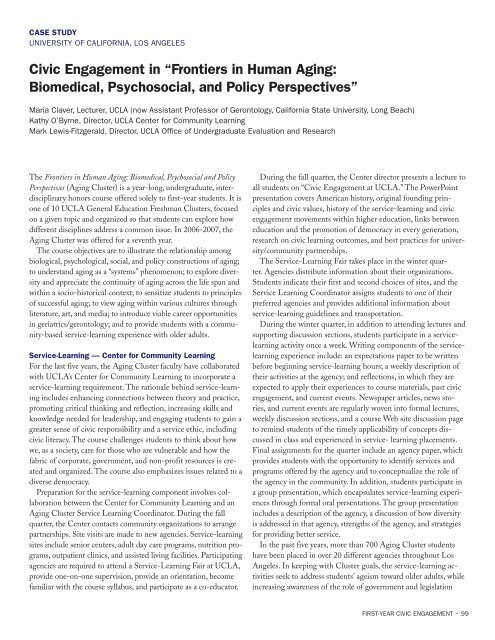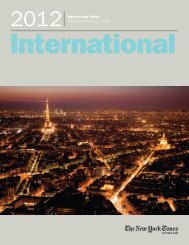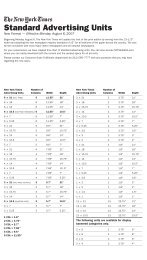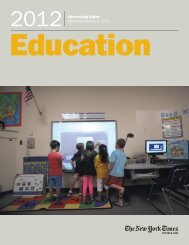First-Year Civic Engagement: Sound Foundations for College ...
First-Year Civic Engagement: Sound Foundations for College ...
First-Year Civic Engagement: Sound Foundations for College ...
You also want an ePaper? Increase the reach of your titles
YUMPU automatically turns print PDFs into web optimized ePapers that Google loves.
CASE STUDYUNIVERSITY OF CALIFORNIA, LOS ANGELES<strong>Civic</strong> <strong>Engagement</strong> in “Frontiers in Human Aging:Biomedical, Psychosocial, and Policy Perspectives”Maria Claver, Lecturer, UCLA (now Assistant Professor of Gerontology, Cali<strong>for</strong>nia State University, Long Beach)Kathy O’Byrne, Director, UCLA Center <strong>for</strong> Community LearningMark Lewis-Fitzgerald, Director, UCLA Office of Undergraduate Evaluation and ResearchThe Frontiers in Human Aging: Biomedical, Psychosocial and PolicyPerspectives (Aging Cluster) is a year-long, undergraduate, interdisciplinaryhonors course offered solely to first-year students. It isone of 10 UCLA General Education Freshman Clusters, focusedon a given topic and organized so that students can explore howdifferent disciplines address a common issue. In 2006-2007, theAging Cluster was offered <strong>for</strong> a seventh year.The course objectives are to illustrate the relationship amongbiological, psychological, social, and policy constructions of aging;to understand aging as a “systems” phenomenon; to explore diversityand appreciate the continuity of aging across the life span andwithin a socio-historical context; to sensitize students to principlesof successful aging; to view aging within various cultures throughliterature, art, and media; to introduce viable career opportunitiesin geriatrics/gerontology; and to provide students with a community-basedservice-learning experience with older adults.Service-Learning — Center <strong>for</strong> Community LearningFor the last five years, the Aging Cluster faculty have collaboratedwith UCLA’s Center <strong>for</strong> Community Learning to incorporate aservice-learning requirement. The rationale behind service-learningincludes enhancing connections between theory and practice,promoting critical thinking and reflection, increasing skills andknowledge needed <strong>for</strong> leadership, and engaging students to gain agreater sense of civic responsibility and a service ethic, includingcivic literacy. The course challenges students to think about howwe, as a society, care <strong>for</strong> those who are vulnerable and how thefabric of corporate, government, and non-profit resources is createdand organized. The course also emphasizes issues related to adiverse democracy.Preparation <strong>for</strong> the service-learning component involves collaborationbetween the Center <strong>for</strong> Community Learning and anAging Cluster Service Learning Coordinator. During the fallquarter, the Center contacts community organizations to arrangepartnerships. Site visits are made to new agencies. Service-learningsites include senior centers, adult day care programs, nutrition programs,outpatient clinics, and assisted living facilities. Participatingagencies are required to attend a Service-Learning Fair at UCLA,provide one-on-one supervision, provide an orientation, becomefamiliar with the course syllabus, and participate as a co-educator.During the fall quarter, the Center director presents a lecture toall students on “<strong>Civic</strong> <strong>Engagement</strong> at UCLA.” The PowerPointpresentation covers American history, original founding principlesand civic values, history of the service-learning and civicengagement movements within higher education, links betweeneducation and the promotion of democracy in every generation,research on civic learning outcomes, and best practices <strong>for</strong> university/communitypartnerships.The Service-Learning Fair takes place in the winter quarter.Agencies distribute in<strong>for</strong>mation about their organizations.Students indicate their first and second choices of sites, and theService Learning Coordinator assigns students to one of theirpreferred agencies and provides additional in<strong>for</strong>mation aboutservice-learning guidelines and transportation.During the winter quarter, in addition to attending lectures andsupporting discussion sections, students participate in a servicelearningactivity once a week. Writing components of the servicelearningexperience include: an expectations paper to be writtenbe<strong>for</strong>e beginning service-learning hours; a weekly description oftheir activities at the agency; and reflections, in which they areexpected to apply their experiences to course materials, past civicengagement, and current events. Newspaper articles, news stories,and current events are regularly woven into <strong>for</strong>mal lectures,weekly discussion sections, and a course Web site discussion pageto remind students of the timely applicability of concepts discussedin class and experienced in service- learning placements.Final assignments <strong>for</strong> the quarter include an agency paper, whichprovides students with the opportunity to identify services andprograms offered by the agency and to conceptualize the role ofthe agency in the community. In addition, students participate ina group presentation, which encapsulates service-learning experiencesthrough <strong>for</strong>mal oral presentations. The group presentationincludes a description of the agency, a discussion of how diversityis addressed in that agency, strengths of the agency, and strategies<strong>for</strong> providing better service.In the past five years, more than 700 Aging Cluster studentshave been placed in over 20 different agencies throughout LosAngeles. In keeping with Cluster goals, the service-learning activitiesseek to address students’ ageism toward older adults, whileincreasing awareness of the role of government and legislation







